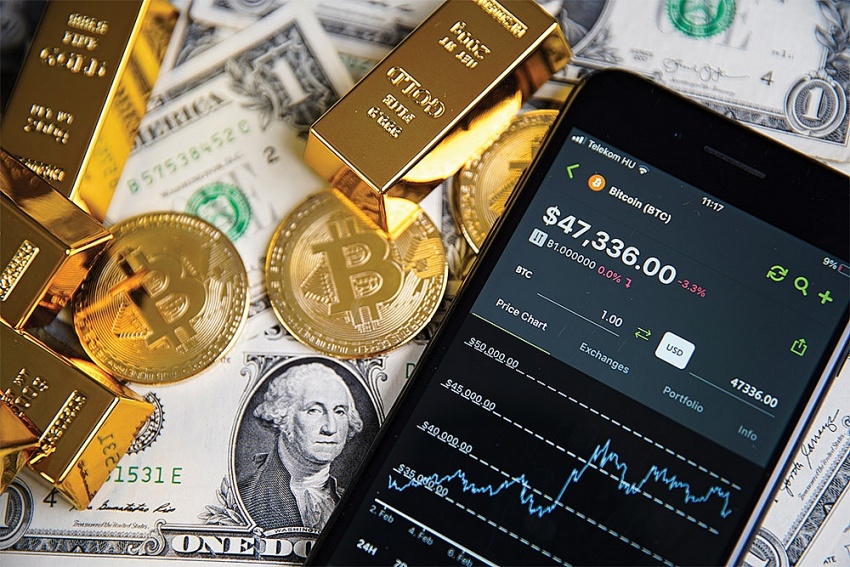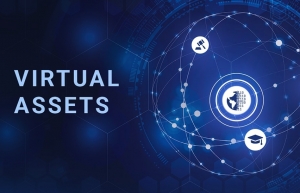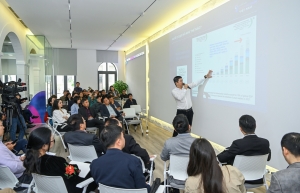Strategic choice ahead for virtual asset management
 |
| Consultations have shown that virtual asset bans could be one direction for the government, photo Shutterstock |
Experts and businesses operating in decentralised finance are actively contributing their views to support the Ministry of Finance in building and completing the legal system on virtual asset management by May 2025.
At the conference on building a legal framework for virtual asset management held by the Vietnam Blockchain Association (VBA) last week, vice president Nguyen Hung said, “The results of consultation with experts and relevant parties conducted by the VBA show that 60 per cent of opinions are leaning towards the option of banning virtual assets (VAs), while the remaining 40 per cent are neutral.”
Do Ngoc Quynh, general secretary of Vietnam Bond Market Association, said that Vietnam needs to make strategic choices regarding the current issue of virtual asset management, instead of trying to avoid it.
“If properly utilised, capital and resources from virtual assets will provide good support for the economy,” Quynh said. “But the important issue is how to manage it to achieve the best benefits for the country, while limiting negative impacts.”
Quynh added that the views of state management agencies in many countries on VA management are currently positive, but most of them are confused when it comes to appropriate behaviour because it is related to national sovereignty and currency.
“The national monetary policy in the early stages of opening up did not allow any foreign currency to be allowed for payment. But Vietnam later also issued a policy allowing people to keep USD and deposit it in banks, but not use it for payments in the economy. If the same thing were applied to VAs now, would it be okay?” he asked.
Remitano, a virtual asset service provider (VASP), hopes that Vietnam will soon issue a suitable legal system to create improvements and policy incentives for providers with many years of experience and reputation in the market.
“Improving the framework in the direction of creating positive conditions for VASPs to operate and develop will encourage foreign businesses to invest in Vietnam,” a Remitano representative said.
The total value on the global scale of virtual assets is expected to account for 10 per cent of global GDP, up to $16 trillion by 2030, according to the World Economic Forum.
In Vietnam, data from the US Department of Justice in 2022 shows that Vietnamese people profited by up to $238 million from cryptocurrency. The total value of cryptocurrencies entering the country from October 2021 to October 2022 amounted to more than $100 billion, according to statistics from Chainalysis.
Although there is no legal framework, virtual currency trading and trading activities in Vietnam are quite vibrant through international exchanges with popular digital currencies such as Bitcoin and Ethereum.
Tran Huyen Dinh, CEO of AlphaTrue JSC, said that by May 2023, the total transaction value of Vietnamese users on a top virtual asset exchange alone was about $20 billion each month.
“The over-the-counter market for virtual assets in Vietnam has a scale of no less than $100 million every day. These are statistics from mid-2023, when the value of Bitcoin was about $30,000, while now the price has increased nearly 40 per cent,” Dinh said.
Statistics from US group Crypto Crunch App also show that Vietnam has nearly 26 million virtual currency owners, ranking third in the world, just behind India and the US.
However, being in the top 20 countries with a high money laundering risk index, as assessed by the Basel AML Index 2023, Vietnam is in the process of researching and building a legal corridor to ban or regulate money laundering for VASPs, expected to be completed in May next year.
Several markets have crafted regulations to manage the cryptocurrency market and VAs over the years. In the US, cryptocurrency was first mentioned in the Infrastructure Investment and Jobs Act signed into law by President Joe Biden in 2021. A cryptocurrency market management law was announced by the European Parliament in May 2023 and is expected to take effect at the end of 2024. In mid-2022, the Hong Kong Securities and Futures Commission announced a mandatory licensing regime for platforms providing cryptocurrency services. Thailand also introduced regulations with its Digital Asset Decree, effective from 2018.
| Phan Duc Trung, vice president Vietnam Blockchain Association VAs are an irreversible global trend. A legitimate VASP must have a work permit and the courage to engage with government agencies to exchange ideas on policies for this sector. Currently, Vietnamese VASPs with work permits operate in markets such as the Czech Republic and Spain. Those in Singapore and Hong Kong operate without work permit, and they all circumvent laws. However, under the influence of the media, those companies appear to be very legal. From the association’s perspective, we present three proposals for entities involved in VAs and VASPs. Firstly, entities have to proactively propose solutions and collaborate with regulatory bodies and professional associations to enhance the legal framework governing related activities. Secondly, entities also need to support community awareness activities within the private sector. This involves preparing customer training programmes, demonstrating compliance procedures, and coordinating with implementing units to safeguard community interests against fraud. Thirdly, entities must actively participate in tax payments alongside professional associations and propose tax payment solutions to underscore the contributions of VASPs to the national economy. Furthermore, feedback related to the legal framework for managing such assets will continue to be collected and forwarded to relevant authorities by the VBA for recommendations to refine the legal framework, in alignment with the economic and social context of Vietnam and international standards, ahead of the deadline. Joe Tu, director of Global Business Development, CoinEx We recognise Vietnam as one of our most promising markets worldwide, given the strong growth of the blockchain community in recent years. CoinEx has set directions to invest in and support the blockchain market in Vietnam. Therefore, a comprehensive legal framework is essential for international companies like ours to integrate into the Vietnamese blockchain market, aiming for sustainable development. We commit to fully comply with legal regulations and ethics in Vietnam, especially those related to anti-money laundering. At the same time, we are ready to support the Chain Tracer initiative initiated by the VBA to trace projects with signs of fraud, aiming to protect users and minimise the consequences of exploiting blockchain technology for malicious purposes. Furthermore, we also believe that enhancing international cooperation among regulatory authorities, law enforcement agencies, and business entities in the industry is crucial to create conditions for VASPs to effectively adhere to the law. Nguyen Doan Hung, former vice chairman State Securities Commission Decision No.194/QD-TTg signed on February 23 has demonstrated the determination of the Vietnamese government to remove Vietnam from the grey list of the Financial Action Task Force on anti-money laundering. This is a resolute and proactive action by the government to restore Vietnam’s reputation in the international community after being placed on the enhanced follow-up list by the task force for lacking sufficient anti-money laundering mechanisms, including combating money laundering through virtual transactions and virtual assets. This is a particularly special opportunity for VASPs operating in the Vietnamese market, as they are poised to participate in the process of building and refining the legal framework for their own operations. From planning to implementation, it is a long journey with many challenges because whether to acknowledge or not, to prohibit or regulate virtual assets will pose conflicts of interest between traditional investment and business groups such as real estate, stocks, bonds, and those pursuing digital economy sectors like blockchain and AI. As a law, it must be applied to all relevant parties. However, currently, new proposed regulations are only focusing on VAs and VASPs, completely disregarding virtual asset providers. With the implementation of international accounting standards from 2025, the legal framework under construction must leave no room for omission of any factor. Only then can a robust economic channel for the nation be built. |
 | Virtual assets in Vietnam: a regulatory outlook While some countries have recognised their legal validity, Vietnam has yet to officially acknowledge virtual assets. Thai Gia Han, associate, and Nguyen Trung Nghia, legal assistant from Indochine Counsel, provide an overview of virtual assets, thereby offering some recommendations on whether virtual assets should be recognised in Vietnam. |
 | Legal framework for managing virtual assets and virtual asset service providers discussed Yesterday, the Vietnam Blockchain Association (VBA) organised a Scientific Workshop to Gather Feedback for Constructing the Legal Framework for Managing Virtual Assets, aimed at collecting opinions from entities, organisations, and individuals operating in the field. |
What the stars mean:
★ Poor ★ ★ Promising ★★★ Good ★★★★ Very good ★★★★★ Exceptional
Related Contents
Latest News
More News
- Masan Consumer names new deputy CEO to drive foods and beverages growth (February 23, 2026 | 20:52)
- Myriad risks ahead, but ones Vietnam can confront (February 20, 2026 | 15:02)
- Vietnam making the leap into AI and semiconductors (February 20, 2026 | 09:37)
- Funding must be activated for semiconductor success (February 20, 2026 | 09:20)
- Resilience as new benchmark for smarter infrastructure (February 19, 2026 | 20:35)
- A golden time to shine within ASEAN (February 19, 2026 | 20:22)
- Vietnam’s pivotal year for advancing sustainability (February 19, 2026 | 08:44)
- Strengthening the core role of industry and trade (February 19, 2026 | 08:35)
- Future orientations for healthcare improvements (February 19, 2026 | 08:29)
- Infrastructure orientations suitable for a new chapter (February 19, 2026 | 08:15)

 Tag:
Tag:



















 Mobile Version
Mobile Version